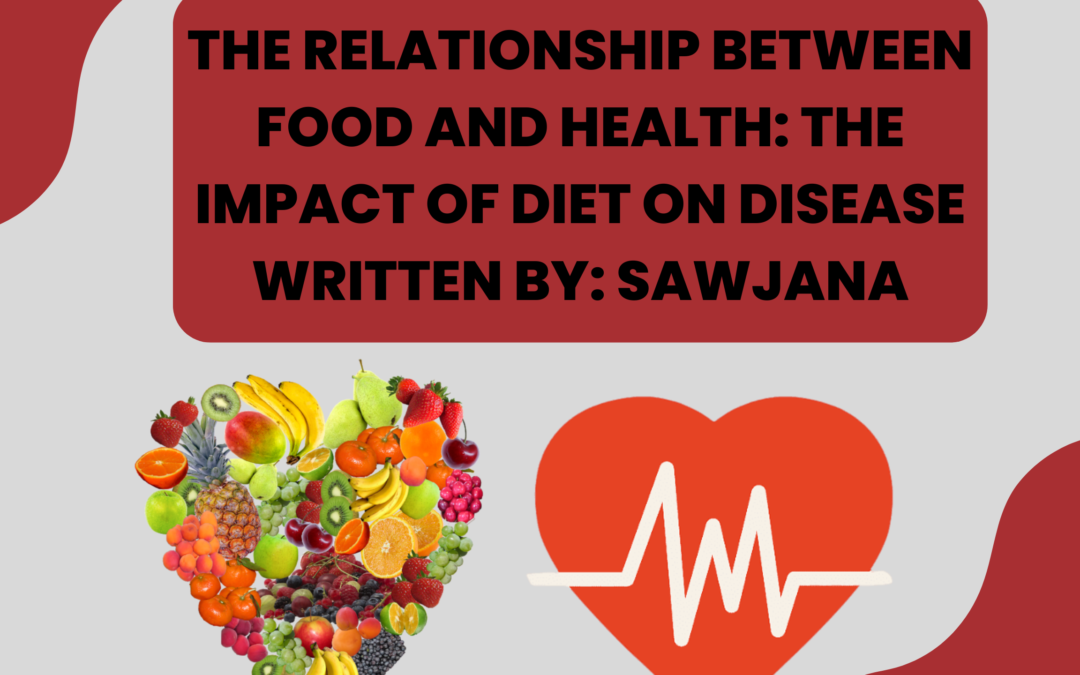Written by: Sawjana
Edited by: Fatima Khan
Designed by: Fatima Khan
Published by: Miriam Alonge Wato

In our fast-paced modern world, where convenience often takes precedence over mindful choices, it is crucial to recognize the profound connection between our diet and overall health. The food we consume not only provides our bodies with nourishment and energy, but also plays a significant role in preventing or exacerbating various diseases. As we delve into the intricate relationship between food and health, we begin to understand the critical impact our dietary choices have on our well-being.
The Foundations of Good Health:
A balanced and nutritious diet forms the bedrock of good health. Consuming a variety of whole foods including fruits, vegetables, whole grains, lean proteins, and healthy fats, provides our bodies with essential vitamins, minerals, and antioxidants. These nutrients support our immune system, promote optimal organ function, and enhance our overall health.
The Link Between Diet and Chronic Diseases:
Scientific research has demonstrated a strong association between our dietary patterns and the development of chronic diseases. Conditions such as obesity, type 2 diabetes, cardiovascular disease, and certain types of cancer have been linked to poor dietary choices. Excessive consumption of processed foods, refined sugars, unhealthy fats, and high-calorie meals contributes to weight gain, inflammation, insulin resistance, and other metabolic disorders.
The Power of Prevention:
The old adage, “prevention is better than cure,” rings particularly true when it comes to diet and disease. Adopting a healthy eating pattern early on can significantly reduce the risk of chronic illnesses. A diet rich in nutrient-dense foods, low in added sugars and unhealthy fats, can help maintain a healthy weight, regulate blood pressure and cholesterol levels, and decrease the likelihood of developing life-altering diseases.
Food as Medicine:
Beyond disease prevention, specific foods possess remarkable healing properties. Numerous studies have highlighted the therapeutic effects of certain dietary components. For example, incorporating omega-3 fatty acids from sources like fatty fish and walnuts can reduce inflammation and improve heart health. Antioxidant-rich foods, such as berries and leafy greens, aid in combating oxidative stress and protect against cellular damage.
Understanding Individual Variations:
While general dietary guidelines are beneficial, it is important to acknowledge that individual variations exist. Factors such as age, sex, genetics, and underlying health conditions influence how our bodies respond to different foods. Tailoring our diets to meet our unique needs can optimize our health outcomes and mitigate the risk of developing diet-related diseases.
The Role of Education and Accessibility:
Creating a healthier society requires a multifaceted approach that encompasses education and accessibility. Empowering individuals with nutrition-based knowledge, teaching them to make informed choices, and providing them with access to affordable and nutritious foods are essential steps towards improving public health. Governments, healthcare systems, and communities must collaborate to foster an environment encouraging and supporting healthier lifestyles.
The relationship between food and health is undeniable, and our dietary choices can significantly impact our well-being. By recognizing the profound influence of diet on the development and prevention of chronic diseases, we can make informed decisions that promote long-term health. Embracing a balanced, nutrient-rich diet and adopting healthy eating habits can transform us to lead healthier, more vibrant lives. Let us prioritize our health by nourishing our bodies with wholesome foods and savouring the benefits of a well-chosen diet!
Here are some links that explore the relationship between food and health, specifically focusing on the impact of diet on disease:
Works Cited
https://www.hsph.harvard.edu/nutritionsource/disease-prevention/
https://www.nih.gov/health-information/nutrition-and-health-issues
https://www.who.int/dietphysicalactivity/publications/trs916/en/
https://www.heart.org/en/healthy-living/healthy-eating/eat-smart/nutrition-basics/aha-diet-and-lifestyle-recommendations
https://www.mayoclinic.org/healthy-lifestyle/nutrition-and-healthy-eating/basics/nutrition-basics/hlv-20049477

